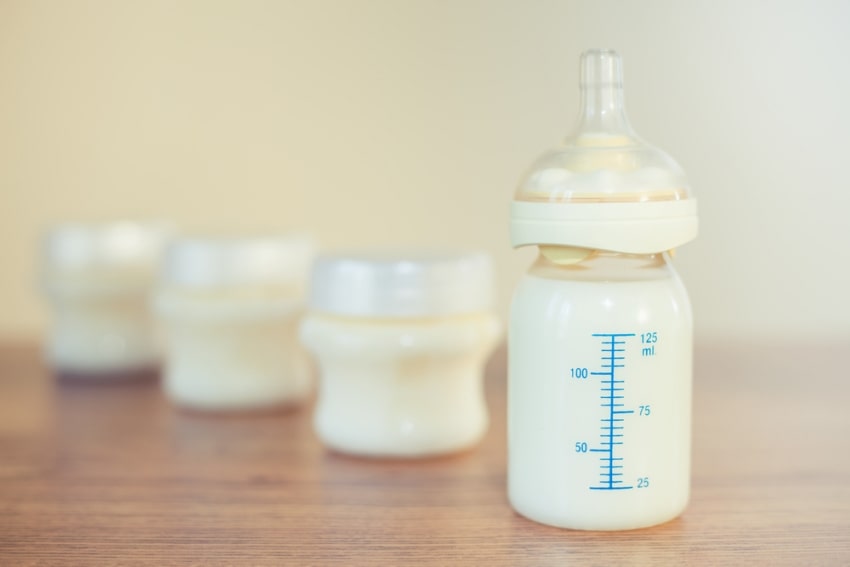As a parent, it’s important to pay attention to what color your baby’s stool is. All white poop can be a sign that there is liver damage. Black poop can signal something else.
Your baby’s bowel movements can tell you a lot about their health, which is why it’s important to understand what is normal, and what’s not. Usually, white curds in baby poop are on the normal spectrum.
Look At Their Diet
The food and drinks in our diet are almost always seen in our bowel movements. For example, you’ll wind up constipated if you’re not drinking enough fluids.
If you don’t digest red dyes properly, you’ll quickly discover that your poop appears a blood-red color even though there’s no blood in it is another great example.
Just like our poop is a direct result of our diet, and can tell us things about us, it can do the same with babies.
Before going down the following list, consider what your little one has been eating lately. Does their diet consist of breastmilk? Formula? Have they started solid foods yet, or tried a new food?
Keep their diet in the back of your mind as you read the rest of the article and it can help you determine the culprit behind the white chunks in their poop.
When Are White Chunks In Baby Poop Normal?
There are quite a few situations that will lead you to find bowel movements like this, and they are nothing to be concerned about.
In fact, this type of poop falls on the normal spectrum more often than most new parents realize! Undigested foods and milk fat are the most common reasons you’ll come across poop that has white curds.
View in gallery
This Is Common In Breastfed Babies
Babies being breastfed is one of the most common reasons for finding white chunks in the stool. This is because of undigested milk fat. Typically, a breastfed baby will have runnier poop that looks like it has little seeds in it.
Those seeds are the undigested milk fat. Larger portions of milk fat can look closer to chunks instead of seeds. However, both are perfectly normal.
If your little one has an all-white poop, this is concerning. Breastfed babies that have white curds or seedy stool will also have poop on the normal spectrum that you’re expecting, like yellow or green. It will not be all white. If it is, contact your pediatrician.
Formula Fed Babies Might Have Undigested Milk Fat Too
Formula-fed babies will also have to digest milk fat. There is not as much milk fat in the formula as there is breastmilk, so this isn’t as common. However, it’s still perfectly normal.
You might not see it as much if your little one has firmer stools, though.
Because of this, it can be a surprise when you open their diaper to find runny poop and white curds but don’t stress about it unless there are other symptoms that you find concerning.
Undigested Food Can Cause White Chunks
If your little one has started eating solid food, it can show up as white chunks in their diaper. This could be because they are not chewing their food all the way.
It could also be because they are still getting used to eating solid food. Examples of some foods that you can almost expect to show up as white chunks or flecks in poop are:
- Cottage cheese
- Yogurt
- Baby snacks like teething biscuits that don’t dissolve
- Cereal (even colored cereal can appear white in poop)
If your baby is eating solid foods, you can expect quite a variety to show up in their poop. Carrots will give you orange or rust-colored bowel movements, for example. You might see chunks of undigested food. This is all perfectly normal.
View in gallery
Toddlers Can Have White Chunks If They Are On A Mainly Milk Diet
Most of the time, parents accidentally put their kids on an all-milk diet. This usually happens when toddlers are sick and only able to hold down fluids.
It’s also seen in picky eaters because they don’t eat as much food, yet continue to drink plenty of milk.
The extra milk in their diet and lack of other foods can cause their bowel movements to cycle back to looking like they did when they were babies, complete with white chunks.
Even if you’re giving your toddler a plate of food at every meal and snack time, it can be hard to notice that they aren’t eating enough.
Pay attention to how much food your little one is eating for a day or two to determine if they are basically consuming an all-milk diet.
If they are, try to give them a larger variety of foods or some of their favorite foods to encourage eating a little bit. You can also give them water to drink if you find the white curds concerning.
White Curds In Poop Is Common In Breastfed Toddlers
Although this is usually because of undigested milk fat because of a baby’s underdeveloped digestive system, it can also be seen in toddlers.
If your toddler is still drinking breastmilk, you can expect them to have the occasional bowel movement with white chunks. The more breast milk there is in their diet, the more frequent this will be. It’s also completely normal.
Signs To Watch Out For If There Are White Curds In Poop
Although this type of bowel movement does fall on the normal spectrum of baby and toddler poop, there are a few things that you want to watch out for.
This can be a signal of something serious and can give you clues of an underlying condition in your baby.
All White Or Pale Poop Can Be An Emergency
If you notice that your baby has an all-white or pale-colored poop, such as a very light yellow, it can be an emergency. You need to contact your pediatrician.
If the liver does not produce bile, or that bile does not get to the digestive system, it can cause serious problems if left untreated. Although this is also seen in babies with a milk allergy or lactose intolerance, it’s always better to be safe instead of sorry.
View in gallery
This Could Be A Sign Of Lactose Intolerance
Pale or white poop can also be a sign of lactose intolerance. So can seeing white chunks in poop. I’m slightly lactose intolerant and have experienced both when I decided that a milkshake was worth the upset stomach.
(I don’t get very sick, so sometimes it really is.) If your little one has either of these, double-check for signs of lactose intolerance. These include:
- Gas
- Fussiness, especially after eating
- Bloody stool or stool with red flecks
- Abdominal pain
- Frothy stool (this is usually due to mucous)
If your little one has lactose intolerance, they might need a different formula or not be able to breastfeed. It’s important to discuss this with your pediatrician.
Food Allergy Is A Common Culprit
Although most of the symptoms above are associated with a milk allergy, they are also seen in other food allergies. If you started your baby on new food and notice these symptoms, they may have a food allergy.
Speak with your pediatrician about this, and stop giving them the new food until you receive advice from their doctor. Usually, the symptoms will clear up once they are not eating the food they are allergic to anymore.
Always Call Your Pediatrician For White Or Chalky Stool
Yes, the white and pale stool can be a sign of lactose intolerance. I can personally testify to that. However, there’s also a chance that it can be a liver problem.
You don’t want to take the wait and see approach without the okay from your doctor. If it’s something more serious your baby could be seriously ill within another day. Instead, call your doctor to be on the safe side.
Call Your Pediatrician If You Have Questions Or Are Concerned
I called my daughter’s pediatrician for every ounce of parenting advice that I needed. (So much so that he actually gave me parenting books.)
I called them when she had a snotty nose when she wouldn’t seem to quit crying, and for a wealth of other things. I learned when to call the doctor and what I could do at home through those phone calls.
If you have questions or are concerned about anything, even if it’s just white chunks in your baby’s poop, give them a call. There’s never a wrong thing to call the doctor about.
In Conclusion
White curds in your baby’s stool are surprisingly normal for bottle-fed and breastfed babies! This is even normal for little ones that have started solid foods.
As long as your little one’s poop is not white or pale, they are on that normal spectrum. If they have an allergy to milk or other food, contact your pediatrician. Even if you’re not concerned, you want it properly documented in their medical records.






